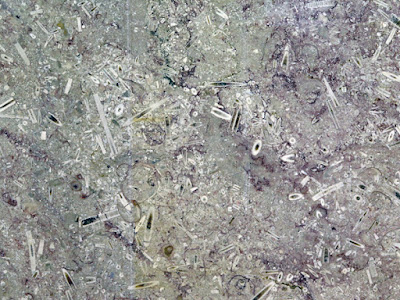As a geologist with experience of the building restoration industry in London, where I developed specialist interests and skills in identifying a wide variety of stones – to satisfy an architect's specification to “match the existing” - I don't need much encouragement to go and take a look at a quarry or a stone yard should the opportunity arise.
Mandale limestone from the 'once-a-week' quarry in Sheldon, near Bakewell in the Peak District National Park, is a very attractive decorative stone and having received a new sample of this in the post from Natural Stone Sales Ltd, I followed this up by visiting their works in Rowsley to have a look at slabs of this highly fossiliferous limestone.
Back in 2002, when I was cataloguing the excellent mineral collection at Clifton Park Museum, various slabs of Mandale limestone that have been used for flooring in this Grade II* Listed building had started to disintegrate and various attempts to repair the floor with epoxy resin had been unsatisfactory.
Unlike both the old and new samples that I have of Mandale limestone, which are uniformly grey in colour, the floor of the museum contains distinctly brown and grey/brown mottled varieties and, for aesthetic reasons at least, it is likely that whole slabs would need to be replaced.
At the time of my temporary contract, a bid for Heritage Lottery Funding to help with a complete refurbishment of the museum, amounting to £3 million, was approved; however, no attempt has apparently been made to address the deterioration of the floor and – 15 years later – it could easily be considered as a Health & Safety hazard, especially to the wearers of high heels who attend the weddings and various other private functions that take place here.
That said, I am now just generally a neutral observer - as a photographer and writer - with no affiliations to contractors or any particular client; however, should the opportunity arise I still offer my stone identification and matching skills but I still think that it is often extremely difficult to get blood out of a stone - due to the politics or the cost cutting that can sometimes be involved.
Hopefully, there are still very many people out there who recognise that business can still be combined with pleasure and that an independent and objective opinion is still valued, with the Language of Stone forming a common denominator.
 |
| A slab from a bed with large brachiopod shells |







No comments:
Post a Comment